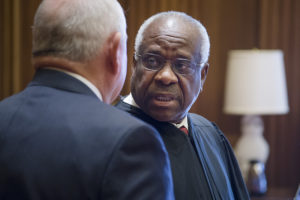
Sonny Perdue is sworn in as the 31st Secretary of Agriculture by U.S. Supreme Court Justice Clarence Thomas with his wife Mary and family April 25, 2017, at the Supreme Court in Washington, D.C.. Photo by Preston Keres
In the National Review, Matthew Continetti tells readers that Supreme Court Associate Justice Clarence Thomas, who rarely says a word during oral arguments, should speak more. Continetti suggests such because he feels America could learn much from Thomas if he chose to share his thoughts on the law more openly. He writes (abridged):
Clarence Thomas needs to speak more. Not for his benefit. For America’s.
This is the justice’s twenty-fifth year on the Supreme Court. He is famously reticent. Not only on the bench, where in February he shocked the media by asking a question during oral argument for first time in a decade, but also in public life.
Other than his 2007 memoir, My Grandfather’s Son, a 60 Minutes interview that accompanied its release, and a smattering of public appearances, including his eulogy for Justice Antonin Scalia, Thomas is more likely to be seen at an RV camp or Nebraska football game than symposia, colloquia, book signings, and public lectures.
Here we are in 2016. The key thinkers of the postwar conservative intellectual movement — figures such as William F. Buckley Jr., Milton Friedman, Irving Kristol, Richard John Neuhaus, Robert Bork, James Q. Wilson, and Scalia — are gone. You can count the number of remaining conservative intellectuals on two hands. That’s if you feel generous.
This is why Thomas matters. His dissents are lucid, well reasoned, pungently argued. His life testifies to the significance of family, literacy, religiosity, diligence, intelligence, and magnanimity. He has recommendations to offer: The U.S. Constitution: A Reader, Invisible Man, Native Son, “Victorian Virtues / Jewish Values” by Gertrude Himmelfarb, the works of Thomas Sowell, the autobiography of Frederick Douglass, a visit to Gettysburg, a screening of John Adams (2008). He is brilliant, devout, patriotic, humble, large-hearted.
We can learn from him. “Now, about our country,” he tells Kristol. “Things may not look good. But we are obligated not to despair. Do I know what the outcome is going to be? No. Do I know that we are going to be vindicated? No. But that’s not why you do it. You don’t do it necessarily to persuade, to feel that you are going to persuade other people.”
Read more here.
If you’re willing to fight for Main Street America, click here to sign up for my free weekly email.




